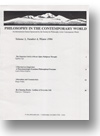|
1.
|
Philosophy in the Contemporary World:
Volume >
3 >
Issue: 4
Egbeke Aja
The Supreme God in an African (Igbo) Religious Thought
abstract |
view |
rights & permissions
| cited by
From African ontology, religious experiences, myths of creation, and language, I argue that even though Africans (Igbo) conceive of supreme deities, none of the adjudged supreme deities is identifiable with the Supreme God propagated by Christian missionaries and theologians. To translate, therefore, the names of African deities, such as Chukwu or Chineke, to mean the God preached by Christians is to yoke to the Igbo religious thought the concept “creation out of nothing,” which is alien to traditional African cosmology. Such a translation will not only distort the architecture of traditional African religion, it will impose on the Igbo the recognition of a deity that would be beyond the reach of their standard reciprocity arrangements with their Gods. Moreover, throughout Igboland, no shrines are dedicated to the worship of an unknown God identifiable with that propagated by Christians.
|
|
|
3.
|
Philosophy in the Contemporary World:
Volume >
3 >
Issue: 4
Roger Paden
Liberalism and Consumerism
abstract |
view |
rights & permissions
| cited by
Communitarians have argued that liberalism somehow causes or leads to a consumer society. Moreover, they have argued that consumer society is somehow morally suspect. Given the connection between liberalism and consumerism, they have argued that the moral problems they have found in consumer society give reason to oppose liberalism. In this paper, after defining “consumerism” and “liberalism,” I examine the various communitarian arguments against consumerism, and the various arguments that seek to connect liberalism to consumerism. I argue that only one of these arguments has any hope of establishing this connection.
|
|





